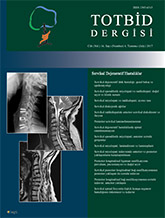
As a condition commonly reported in Far East countries, ossification of posterior longitudinal ligament (OPLL) is a condition which may cause cervical myelopathy or radiculopathy by narrowing the spinal tract. Since it is not a well-known disease and rarely reported in our country, the objective of this study is to describe the etiology, epidemiology, presentation, and natural history of OPLL accompanied with related literature. Even the etiology of this condition is still not fully determined, the studies demonstrate that factors such as genetics, environmental factors, hormones and lifestyle are effective in the progression of the disease. OPLL is reported more frequently in men and after age 40 and the prevalence of this condition is between 2% and 4% in Far East countries, whereas the in non-Asian countries it is between 0.01% and 2%. Despite the fact that OPLL can be diagnosed in all levels of the vertebra, it is most frequently seen in the cervical region. From asymptomatic conditions to an advanced level of disability, OPLL has a clinical presentation in a broad spectrum. Direct graphy, computed tomography (CT) and magnetic resonance (MR) imaging are used along with physical examination for diagnosis of this condition. Notably, CT has a great value in classification and pre-operative planning. While a conservative treatment is preferred for patients with mild to moderate symptomatic or non-progressive disease, surgical treatment should be considered for patients with progressive symptoms who do not respond to conservative treatment.